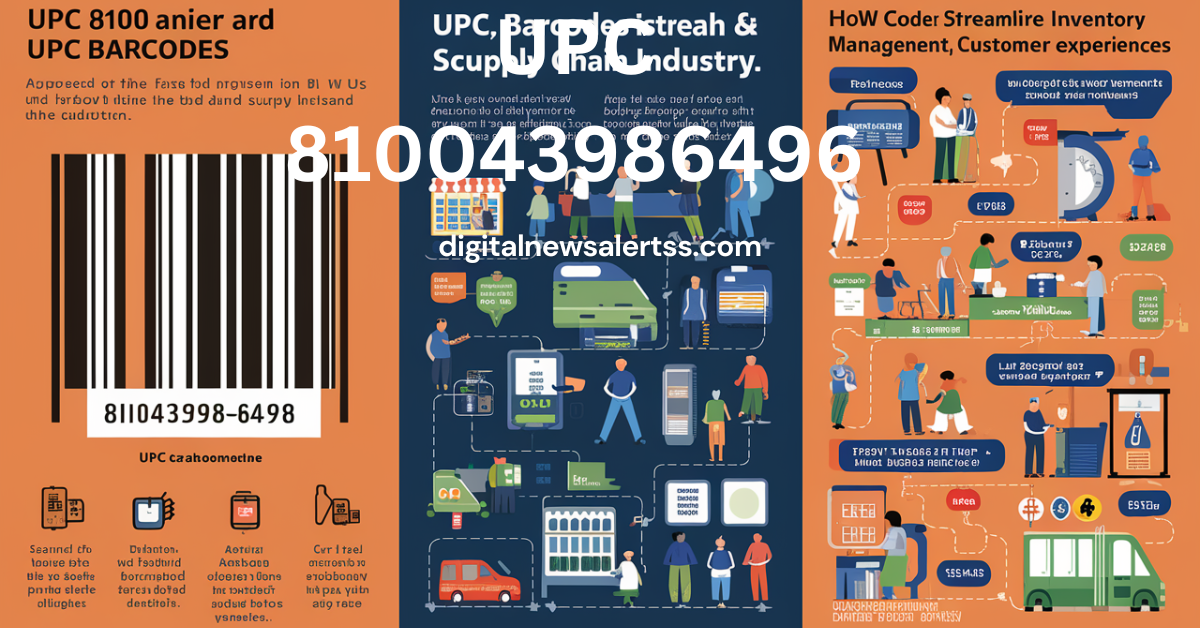In the bustling world of retail and e-commerce, Universal Product Codes (UPCs) play a crucial role in product identification and inventory management.
This article delves into the specifics of UPC 810043986496, exploring its significance, the role of UPCs in the retail ecosystem, and offering a comprehensive analysis of its importance.
Whether you’re a consumer trying to understand what a UPC means or a retailer looking to grasp the intricacies of product identification, this guide will provide valuable insights.
What is a UPC?
A Universal Product Code (UPC) is a 12-digit numerical code used to uniquely identify products in retail and e-commerce environments. The UPC system, introduced in the 1970s, was designed to streamline the checkout process and improve inventory management. Each UPC is associated with a specific product, enabling businesses to track sales, manage stock, and ensure accurate pricing.
Breakdown of UPC 810043986496
Understanding the Structure
UPC 810043986496 is composed of several distinct parts:
- Prefix: The initial digits (typically 6-7 digits) indicate the manufacturer or company that has registered the product. In this case, “810043” refers to a specific company or brand.
- Product Code: The next set of digits (usually 4-5 digits) represents the specific product within the manufacturer’s inventory. For UPC 810043986496, “98649” identifies the exact product.
- Check Digit: The final digit, “6” in this instance, is used to verify that the UPC has been scanned correctly.
Importance of UPC 810043986496
UPC 810043986496, like any UPC, helps in various aspects of retail management:
- Inventory Tracking: Retailers use UPCs to keep accurate records of stock levels. This helps in managing inventory more effectively and reducing stockouts or overstock situations.
- Sales Tracking: UPCs assist in monitoring sales performance. By analyzing sales data associated with specific UPCs, retailers can identify trends and make informed business decisions.
- Pricing Accuracy: UPCs ensure that the correct price is charged at checkout, reducing pricing errors and improving customer satisfaction.
The Role of UPCs in E-Commerce
In the e-commerce realm, UPCs are equally vital. They help in:
- Product Listings: Online marketplaces and retailers use UPCs to list and categorize products accurately. This ensures that customers find the exact item they’re searching for.
- Search Engine Optimization (SEO): Properly using UPCs in product descriptions and metadata can enhance search engine visibility, making it easier for potential buyers to find the product.
How to Look Up UPC 810043986496
Using Online Databases
There are several online databases where you can look up details associated with UPC 810043986496:
- UPC Database Websites: Websites like UPCDatabase.org and Barcode Lookup allow users to search for product information using UPC codes.
- Retailer Websites: Major retailers often provide product details on their websites when you enter the UPC in the search bar.
Mobile Apps
Various mobile apps can scan UPC codes to provide product information, reviews, and pricing:
- Barcode Scanner Apps: Apps like ShopSavvy or ScanLife enable users to scan UPCs with their smartphones to retrieve product details.
Interpreting Product Information
When looking up UPC 810043986496, you might find:
- Product Name: The exact name of the product.
- Manufacturer Details: Information about the company that produced the item.
- Pricing: Retail prices from different sellers.
- Product Description: Specifications, features, and other relevant details.
Insights and Analysis
The Evolution of UPCs
The UPC system has evolved significantly since its inception. Initially designed for grocery stores, UPCs now play a pivotal role across various industries, including electronics, pharmaceuticals, and apparel. Modern UPCs are often integrated with advanced technologies such as Radio Frequency Identification (RFID) for enhanced tracking and management.
Challenges with UPCs
While UPCs offer numerous benefits, there are challenges:
- Data Accuracy: Incorrect UPCs or data entry errors can lead to issues with inventory and pricing.
- Counterfeiting: Some counterfeit products may use fake UPCs to mislead consumers. Ensuring that products are sourced from reputable sellers can help mitigate this risk.
FAQs About UPC 810043986496
What does UPC 810043986496 represent?
UPC 810043986496 is a unique code assigned to a specific product for identification in retail and e-commerce.
How can I find more information about UPC 810043986496?
You can use online databases or mobile apps to look up details associated with UPC 810043986496.
Why is UPC 810043986496 important for retailers?
It helps in managing inventory, tracking sales, and ensuring pricing accuracy.
Can UPC 810043986496 be used to search for products online?
Yes, entering UPC 810043986496 in search engines or retailer websites can help locate the product.
How do UPCs help in e-commerce?
UPCs aid in accurate product listings, inventory management, and improving search engine visibility.
Are there any risks associated with UPCs?
Yes, risks include data entry errors and counterfeiting, which can affect inventory and consumer trust.
What should I do if I find a discrepancy with UPC 810043986496?
Contact the retailer or manufacturer for clarification and to ensure product authenticity.
Conclusion
UPC 810043986496 is a prime example of how universal product codes simplify and enhance the retail and e-commerce experience. By providing a unique identifier for products, UPCs enable efficient inventory management, accurate pricing, and seamless sales tracking. Understanding the structure and significance of UPCs helps consumers and retailers alike navigate the vast network of products available in the marketplace.
By leveraging the insights provided in this article, both consumers and businesses can better appreciate the role of UPCs and ensure they are using this system to its fullest potential.



